August 19, 2014
Edited by David Sanders
Specimen Days
1398 – Marqués de Santillana, Spanish poet (d. 1458), is born.
1631 – John Dryden, 1st poet laureate of England (All for Love), is born.
1902 – Ogden Nash, Rye NY, humorous poet (I'm a Stranger Here Myself), is born.
1936 – Federico Garcia Lorca, Spanish poet/composer, murdered at 37 or 38.
1957 – Li-Young Lee, Indonesia-born American poet, is born.
1994 – Robert Ivanovich Rozhdestvensky, poet, dies at 64.
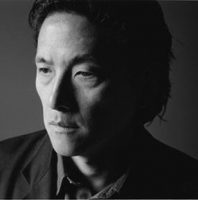
Sometimes my love is melancholy
and I hold her head in my hands.
Sometimes I recall our hair grows after death.
Then, I must grab handfuls
of her hair, and, I tell you, there
are apples, walnuts, ships sailing, ships docking, and men
taking off their boots, their hearts breaking,
not knowing
which they love more, the water, or
their women's hair, sprouting from the head, rushing toward the feet.
—from "Dreaming of Hair" by Li-Young Lee
Li-Young Lee was born this week in 1957.
World Poetry
Poets Regale Urdu Lovers at TUF Mushaira
Two moving poems, capturing the pain and pathos of the Muslim world in the face of the Israeli onslaught in Palestine, were the highlights of an interesting poetry evening organized by the Telangana United Forum (TUF) in Jeddah on Thursday. Both poems — one by Aalami Urdu Markaz President Athar Nafees Abbasi (“Jinke bache lahu me nahaye huwe … Raushni likhte likhte abhi so gaye”) and other by veteran writer and journalist Muhammad Mujahid Syed (“Koyi to dasht-e-haulnaak me meri sada sune”) — drew loud applause from the select gathering of Urdu aficionados. More
Poet Tattoos Demand That Minister Resigns
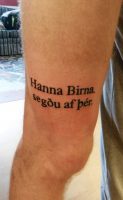
Poet Bragi Páll Sigurðarson just disclosed his new tattoo. It is situated on his right thigh, just above the knee. Unlike most tattoos, this one is written in Times New Roman. One sentence, split in two lines, it reads: “Hanna Birna, segðu af þér.” That is: “Hanna Birna, resign.” Standard punctuation. The direct message is as clear-cut as the typography. The demand, of course, refers to the scandal surrounding Iceland’s Interior Minister in recent months, which has been duly covered in this paper. More.
Poet Bragi Páll Sigurðarson just disclosed his new tattoo. It reads: “Hanna Birna, resign.”
Recent Reviews
The 'Lost' Poetry of World War One
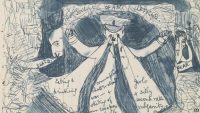
by Vincent Dowd
The centenary of World War One means the work of the British war poets has been much quoted of late. But the reputation of writers critical of the war, such as Siegfried Sassoon and Wilfred Owen, grew mainly after 1918. In the early months of war newspapers printed stirringly patriotic verse on a daily basis. That work has almost disappeared from view – but is it entirely worthless? More.
Philip Larkin: Life, Art and Lovely by James Booth, Book Review: Jazz and Casual Racism
By Sean O'Brien
WB Yeats distinguished between the writer of the poems and the "bundle of accident and incoherence" who sits down to breakfast. The task of the biographer is made problematic by the search for a coherent personality rather than what might be more accurate – an array of behaviour and attitude marked by contradiction. As we know from experience, people often don't add up, except in books. Modern biographies are closely allied to realist novels, with all the conventions and tidyings and thematic hierarchies that implies, plus an apparatus of evidence and justification. More.
A Poet, Like a Priest, Works with Facts and Mysteries: the Poetry of Spencer Reece
by Dan Wilkinson
Poet and Episcopal priest Spencer Reece’s recent book, “The Road To Emmaus” (Farrar, Straus and Giroux, $24.00), is a warm and generous collection of narrative poems that explores life with humble insight and restrained brilliance.
Reece writes about his family’s history, a relationship formed in a coming-out support group, friendship with his AA sponsor, seminary life, and his experiences as a hospital and prison chaplain. Poetry about love and death and God risks succumbing to saccharine sentimentality, but Reece approaches these subjects with an honest clarity and gentle lyricism that is refreshing. Re-reading passages in preparation for this review, I found myself again and again being pulled into these poems, poems that after only a few readings already feel intimately familiar. More.
Feministing Readz: Dorothea Lasky’s Rome
by Isabel Ortiz
These days, it seems like wound talk is everywhere. Throughout the blogosphere, feminist writers have explosively reopened public discussions of how to articulate and theorize their pain. In April, Leslie Jamison sketched an expansive topography of wounded women of poetry and prose, challenging the frequent dismissal of female pain as condescendingly lumped into the genre of “confessional.” More.
A Thousand Labyrinths
by Ange Mlinko
“Periplum, not as land looks on a map / but as sea bord seen by men sailing,” we read in Canto 59 of Ezra Pound’s magnum opus. The Oxford English Dictionary tells us Pound derived periplum from periplus, the ancient Greek word for an account of a circumnavigation by ship. Peri means “around”; plus means “to voyage” and, in one grammatical variant, “to swim.” Swimming around, you might say, is just what we do when we pick up Pound’s Cantos. Thrown into the deep end of literary history, it is sink or swim from the very first line: “And then went down to the ship.” Why change the plus to plum? The coinage evokes a host of associations: a ripe plum (round like the globe); a plumb line; purpleness (compare the French périple). There may even be a pun on plume (feather, pen, nom de). More.
The centenary of World War One means the work of the British war poets has been much quoted of late.
Broadsides
Catching Cold
by Steven G. Kellman
In a cartoon that earned him a Pulitzer Prize, Bill Mauldin shows two men at hard labor in a Soviet gulag. “I won the Nobel Prize for literature,” one tells the other. “What was your crime?” In 1958, when the cartoon was published, it was obvious that the hapless Nobel laureate was supposed to be Boris Pasternak, whose literary achievements earned him expulsion from the Union of Soviet Writers and harassment so unnerving it pushed him to the verge of suicide. “It is not seemly to be famous,” a poem by Pasternak begins. “Celebrity does not exalt.” More.
Word for Word: To Read or Not to Read
Is poetry meant for the ear or the eye?
by Maureen Kennelly
‘For poetry readings, the general rule is that if the poet is outnumbered it is a success.” This remark by the poet and undertaker Thomas Lynch informed the title of the late Dennis O’Driscoll’s enthralling book of essays The Outnumbered Poet. In it O’Driscoll casts a sometimes fond, sometimes acerbic eye back at some memorable readings. Not all poets take to the business of reading their work aloud with relish. Wallace Stevens could not imagine a more ghastly enterprise and suggested that “poets, like millionaires, should neither be seen nor heard”. More.
“For poetry readings, the general rule is that if the poet is outnumbered it is a success.”
Drafts & Fragments
Language Becomes a Character
by Janet R. Kirchheimer
Joseph Brodsky in his 1987 Nobel Lecture stated, “There are, as we know, three modes of cognition: analytical, intuitive, and the mode that was known to the biblical prophets: revelation. What distinguishes poetry from other forms of literature is that it uses all three of them at once (gravitating primarily toward the second and the third). For all three of them are given in the language; and there are times when, by no means of a single word, a single rhyme, the writer of a poem manages to find himself where no one has even been before him, perhaps than he himself would have wished to go. The one who writes a poem writes it above all because verse writing is an extraordinary accelerator of consciousness, of thinking, of comprehending the universe.” More.
On Poetry Awards: Figures and Questions
by Jonathan Hobratsch
I write this blog to encourage discussion among poets regarding poetry awards. To do this, I will begin with showing some figures on the awards, along with some observations. Finally, I'll end by posing 10 questions. The numbers below come from a MS Excel database that I have created. I have noted every contemporary poet (a poet living at least a day in the 21st century) that has won at least one of 30 major poetry awards. I will list these 30 awards at the bottom of this blog. The full list of "Top 100 Poets" will appear in the forthcoming Fall issue of The Literati Quarterly. Finally, I'd like to assuage the critics that have read up to this point by making an obvious statement: poetry awards are not an infallible index for poetic greatness. Many writers are overlooked each year. More.
Joseph Brodsky once said, “There are, three modes of cognition: analytical, intuitive, and the mode of the biblical prophets: revelation.
Poetry In the News
Rail Passengers Hear Work of Great War Poet

An actor from St Helens regaled unsuspecting train passengers with poignant readings of Wilfred Owen’s war poetry – 100 years on from the beginning of the First World War. Phil Gwilliam, who played rugby as a youngster alongside the likes of Paul Sculthorpe and Paul Wellens, read Owen’s poetry – including the classic Dulce Et Decorum Est – to passing commuters at New Brighton station on the Wirral on Saturday. More.
Hebridean Poet Wins UK's Richest Poetry Prize with Debut Collection

A 29-year-old poet from the outer Hebrides has won the UK’s richest poetry prize with a debut collection that evokes the island where he grew up with “a recurring sense of wonder.” Niall Campbell, who combines writing with looking after his five-month-old son, was awarded the £20,000 Edwin Morgan prize at the Edinburgh international book festival. More.
An actor regaled unsuspecting train passengers with poignant readings of Wilfred Owen’s war poetry.
New Books
The Lantern Cage by Kelly Grovier
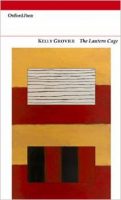
[Paperback] Carcanet Press Ltd, 96 pp., $16.99
The poems that Kelly Grovier’s third collection, The Lantern Cage, brings together are prompted by scenes that occur in life’s everyday spaces—city streets and secondhand shops, museum galleries and trains. The title conjures contrasting images of illumination and shadow, warmth and confinement, the burning soul and the material body. These are poems that seek to shine a warm light on the mysteries that underlie our existence. This is a world of “undeciphered sands,” “lost cathedrals,” “buried books,” and “bone machines”—a land where substance and shadow blur. It is a collection that is by turns lyrical and philosophical, romantic and playful.
Familiars: Poems by Fred Chappell
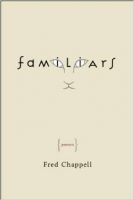
[Paperback] Louisiana State University Press, 80 pp., $17.95
Solitary, graceful, and contemplative, cats have inspired poets from Charles Baudelaire to Margaret Atwood to serve as their chroniclers and celebrants. They have appeared, wrapped in their inscrutability, in verse both sensual and spiritual, weary and whimsical. With Familiars, Fred Chappell proves himself a worthy addition to the fellowship of poets who have sought to immortalize their beloved cats.
Inside Spiders by Leslie Shinn
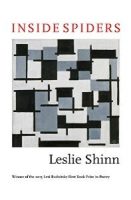
[Paperback] Persea, 64 pp., $15.95
Winner of the 2013 Lexi Rudnitsky First Book Prize, a collection of gemlike poems combining delicacy with unmistakable hardiness. These poems are exquisite, deceptively complex revelations of the domestic and natural worlds: chiseled, unflinching, set beside a “painted paper lake/of gilded folds laid straight,/the gowned hills/on hidden feet/late coming light.” Reminiscent of the writing of Robert Creeley, Shinn’s debut conveys a life condensed—deeply felt and keenly observed.
The poems in Kelly Grovier’s The Lantern Cage, are prompted by scenes that occur in everyday spaces.
Correspondences
Greta Stoddart
by Katy Evans-Bush
Greta Stoddart is a subtle, surprising poet whose work seems to hinge on those moments when everything might just change. Her first book came out in 2001 and established her reputation, with its beautifully sensual, uncomfortable poems about relationships, sexuality and the interior life. In 2005 she was named in Mslexia magazine’s list of the top ten contemporary women poets. She trained in theatre and toured for years with a physical theatre company, and her poems owe to this background a sense of performance, and a sense of the immediate dramatic moment. She regularly speaks her poems by heart and is an electrifying performer. More.
Alison Powell Dissects Myths to Uncover Human Complexity
by Victoria Fleischer
Alison Powell has always been a fan of the underdog. In her debut collection of poetry, “On the Desire to Levitate,” the writer takes that attraction as inspiration for her work. “I think that poetry, especially in the Western world, has such a tradition of celebrating beauty and celebrating passion and love. I’ve always been particularly drawn to and interested in poetry that sort of digs its way into the crevices of life that may be less attractive, less traditionally attractive,” Powell told Art Beat. More.
Billy Collins: ‘When I start a poem, I assume the indifference of readers’

by Sara Keating
‘The idea of a popular poet is a bit of an oxymoron in people’s minds,” says Billy Collins, the luminary lyricist and former American poet laureate, who will give a public reading at this year’s Kilkenny Arts Festival. “If the general population has to go out of their way to find poetry, if they have to go to the library or bookstore, I’m not sure they will. We shouldn’t have to seek out poetry; it should seek us out. It needs to be part of everyday life.” More.
“When I start a poem, I assume the indifference of readers.” –Billy Collins
Envoi: Editor’s Notes
GONE FISHIN'
GONE FISHIN’